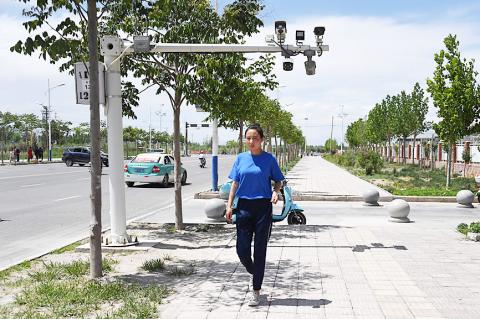Uighur activists on Tuesday said that they have documented nearly 500 camps and prisons run by China to detain members of the ethnic group, alleging that Beijing could be holding far more than the commonly cited figure of 1 million people.
The Washington-based East Turkistan National Awakening Movement, a group that seeks independence for the Xinjiang region, gave the geographic coordinates of 182 suspected “concentration camps” where Uighurs are allegedly pressured to renounce their culture.
Researching imagery from Google Earth, the group said it also spotted 209 suspected prisons and 74 suspected labor camps, for which it would share details later.

Photo: AFP
“In large part, these have not been previously identified, so we could be talking about far greater numbers” of people detained, movement director of operations Kyle Olbert said.
“If anything, we are concerned that there may be more facilities that we have not been able to identify,” he told a news conference in Washington.
Anders Corr, an analyst who formerly worked in US intelligence and who advised the group, said that about 40 percent of the sites had not been previously reported.
Rights advocates have generally estimated that China is detaining more than 1 million Uighurs and members of other predominantly Muslim ethnicities, but US Assistant Secretary of Defense for Asian and Pacific Security Affairs Randall Schriver in May said that the figure was “likely closer to 3 million citizens” — an extraordinary number in a region of about 20 million people.
Olbert said that archive imagery from alleged camp sites showed consistent patterns — steel and concrete construction over the past four years, along with security perimeters.
He said that the group tried to verify the nature of each site with on-the-ground accounts, but declined to give greater detail, citing the need to protect sources.
The Chinese Ministry of Foreign Affairs said that the allegations were “baseless.”
“East Turkestan organizations outside China have long conducted activities harming China’s national security,” ministry spokesman Geng Shuang (耿爽) said at a regular media briefing in Beijing yesterday.
He said it was “clear for all to see” that China’s policies in Xinjiang had promoted “ethnic unity and social harmony.”
Activists and witnesses say China is using torture to forcibly integrate Uighurs into the Han majority, including pressuring Muslims to give up tenets of their faith — such as praying, and abstaining from pork and alcohol.
Olbert described China’s policy as “genocide by incarceration,” fearing that Uighurs would be held indefinitely.
“It’s like boiling a frog. If they were to kill 10,000 people a day, the world might take notice, but if they were just to keep everyone imprisoned and let them die off naturally, perhaps the world might not notice. I think that’s what China is banking on,” Olbert said.
China has justified its policy after first denying the existence of the camps, saying it is providing vocational training and coaxing Muslims away from extremism.
The US has likened China’s treatment of Uighurs to Nazi Germany’s concentration camps, but Beijing has faced limited criticism outside the West.

CHAOS: Iranians took to the streets playing celebratory music after reports of Khamenei’s death on Saturday, while mourners also gathered in Tehran yesterday Iranian Supreme Leader Ayatollah Ali Khamenei was killed in a major attack on Iran launched by Israel and the US, throwing the future of the Islamic republic into doubt and raising the risk of regional instability. Iranian state television and the state-run IRNA news agency announced the 86-year-old’s death early yesterday. US President Donald Trump said it gave Iranians their “greatest chance” to “take back” their country. The announcements came after a joint US and Israeli aerial bombardment that targeted Iranian military and governmental sites. Trump said the “heavy and pinpoint bombing” would continue through the week or as long

TRUST: The KMT said it respected the US’ timing and considerations, and hoped it would continue to honor its commitments to helping Taiwan bolster its defenses and deterrence US President Donald Trump is delaying a multibillion-dollar arms sale to Taiwan to ensure his visit to Beijing is successful, a New York Times report said. The weapons sales package has stalled in the US Department of State, the report said, citing US officials it did not identify. The White House has told agencies not to push forward ahead of Trump’s meeting with Chinese President Xi Jinping (習近平), it said. The two last month held a phone call to discuss trade and geopolitical flashpoints ahead of the summit. Xi raised the Taiwan issue and urged the US to handle arms sales to

BIG SPENDERS: Foreign investors bought the most Taiwan equities since 2005, signaling confidence that an AI boom would continue to benefit chipmakers Taiwan Semiconductor Manufacturing Co’s (TSMC, 台積電) market capitalization swelled to US$2 trillion for the first time following a 4.25 percent rally in its American depositary receipts (ADR) overnight, putting the world’s biggest contract chipmaker sixth on the list of the world’s biggest companies by market capitalization, just behind Amazon.com Inc. The site CompaniesMarketcap.com ranked TSMC ahead of Saudi Aramco and Meta Platforms Inc. The Taiwanese company’s ADRs on Tuesday surged to US$385.75 on the New York Stock Exchange, as strong demand for artificial intelligence (AI) applications led to chip supply constraints and boost revenue growth to record-breaking levels. Each TSMC ADR represents

State-run CPC Corp, Taiwan (CPC, 台灣中油) yesterday said that it had confirmed on Saturday night with its liquefied natural gas (LNG) and crude oil suppliers that shipments are proceeding as scheduled and that domestic supplies remain unaffected. The CPC yesterday announced the gasoline and diesel prices will rise by NT$0.2 and NT$0.4 per liter, respectively, starting Monday, citing Middle East tensions and blizzards in the eastern United States. CPC also iterated it has been reducing the proportion of crude oil imports from the Middle East and diversifying its supply sources in the past few years in response to geopolitical risks, expanding